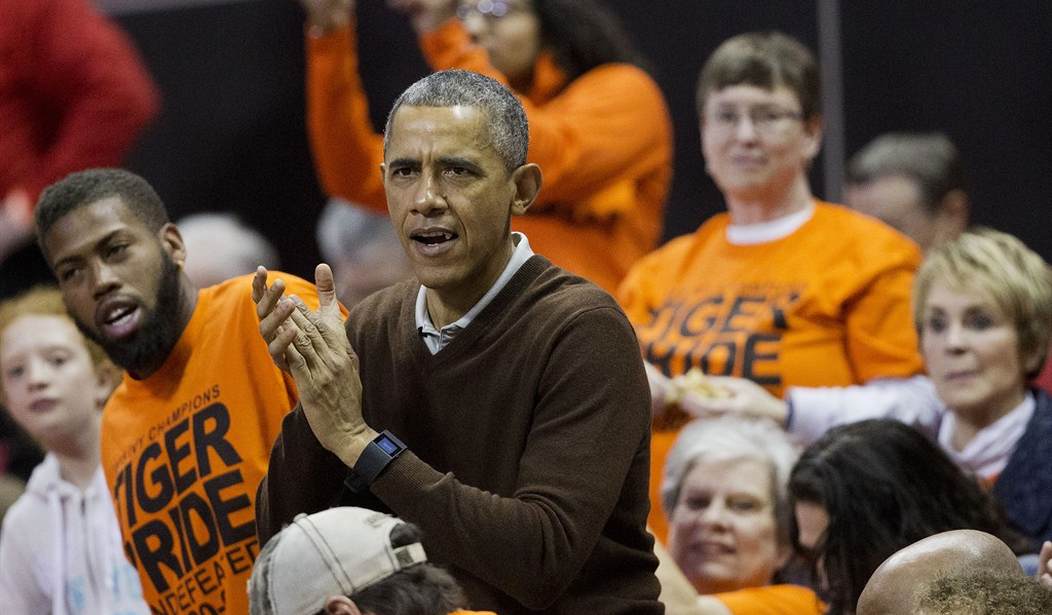Vladimir Putin scheduled the war to retake the Baltic States – Estonia, Latvia and Lithuania – for the first half of the last Final Four college basketball game. He anticipated, correctly, that the President’s focus would be on his brackets instead of Russia’s plan to recapture its former glory.
The signs were all there – prior aggression in Georgia, the invasion of Ukraine, the unscheduled “maneuvers” in both Russia and Belarus adjacent to the panicking Baltic States’ borders, the provocative military flights into their airspace and that of nearby Sweden. And the administration, fixated on pushing through its domestic agenda and a legacy-building nuclear deal with Iran at all costs, ignored them.
A week before, the Secretary of State had said in an interview that, “Russia has a legitimate interest in Eastern Europe that we in the West are bound to respect.” Putin had taken that as tacit validation of a Russian sphere of influence over its former subject states.
Worse, when asked about their commitment to their NATO Article 5 duty to come to the aid of members subject to aggression, most NATO signatories failed to clearly reaffirm their commitment to fight for the defense of their allies. Germany’s leaders stated that, “War will not resolve our differences. Turkey’s Islamic leadership announced that, “War is not an option.” Greece’s far left government criticized the Baltic States’ “capitalist tendencies.” And worse, the American government refused to be forthright and resolute. Putin saw NATO’s weakness and prepared to act.
The Poles, who had been down this road many times before, quietly mobilized their reserves. Their intelligence service discovered Putin’s plan a few hours prior to execution, but the White House refused to take the Polish president’s desperate phone call. He was told that the President of the United States was “indisposed.” In his White House suite, the President cheered and gobbled gourmet popcorn as his favorite team took the lead.
Recommended
The initial cyberattack took down the Internet in the Baltic States and non-NATO member Sweden, which was unlucky enough to hold key terrain. The Russians were careful to avoid any attack on the rest of Europe. Putin planned to do nothing to help stiffen NATO’s spine.
The Russians moved in a synchronized series of air, sea and land attacks, emphasizing speed to attain unassailable positions before NATO could react, should it actually decide to. In the Baltic Sea, a merchant ship out of St. Petersburg turned off course toward the southwestern tip of the Swedish Island of Gotland. Gotland was protected by a single 150-man infantry company the jittery Swedes had deployed there a week before in response to the tensions. The freighter disgorged 500 Russian marines, who took out the Swedish forces, then set up a perimeter and unloaded a dozen anti-ship and anti-air missile batteries. Russian now dominated the entrance into the Baltic Sea. Even if NATO naval or air forces were inclined to intervene, they would now have to run that deadly gauntlet first.
Simultaneously, Russian armored forces blitzkrieged across the borders of the three countries as jets shrieked overhead to strike key targets. Spetsnaz operators previously infiltrated into the countries struck pre-planned targets, assassinating officials and destroying communications facilities. “Oppressed” Russian minorities mobilized well-armed militias within all three nations.
It was the United States Ambassador in Vilnius who finally reached the President. They had been friends at Harvard, sharing all-night, choom-filled dorm discussions about America’s imperialism and racism, and he had later been a key donor. That’s why he had the President’s private cell number and could text him: “Barry, the Russians are invading Lithuania! I hear explosions! Please get us out of here!”
The President reluctantly decamped to the situation room, where one TV monitor was changed from CNN to the ongoing game. Key leaders began arriving, but not the Chairman of the Joint Chiefs of Staff. He was still in the air, flying home after cutting the ribbon at the new “United States Military Center of Excellence for Diversity.”
The situation was grim. The Baltic States invoked Article 5, but many NATO allies responded that they were “consulting” instead of forthrightly affirming their intention to honor their obligation to come to the aid of their allies. Sweden was mobilizing, but Russian missiles had struck and sunk two of its cruisers. The Baltic States themselves had well-trained forces who were in contact with the enemy, but they could not stand alone for long against the fury of the Bear.
Besides slashing the military to fund entitlements for Democrat constituencies, America had largely abandoned Europe since the 90s, leaving the President with limited options. During the Cold War, hundreds of thousands of American warriors had faced the Soviet Union. Now, there was one infantry and one mechanized brigade combat team left on the continent, and both were far away from the battle. Available Air Force and Navy assets were minimal.
Yet a month before, the president had reluctantly authorized the deployment of a company of United States M1A2 Abrams tanks to Lithuania as a sign of resolve. Putin, not surprisingly, had considered the 200 combat and support troops, without artillery, as a joke. However, he realized that destroying American forces could create such outrage as to perhaps force even this President to act against his natural instinct toward appeasement. For that reason, the Russian ambassador arrived at the State Department headquarters at Foggy Bottom with a message: Russia was intervening to protect Russian minorities being oppressed by the Baltic governments. This was purely internal matter and not an attack on NATO. If American forces kept out of the fight, Russian forces would not engage them.
For the last two decades, the military has been discussing the implications of the “strategic corporal,” a low-ranking soldier who, because of the nature of the media and technology, finds himself making decisions on the battlefield that have huge strategic implications. The “strategic corporal” in the Baltics War was actually a captain, a West Pointer named Jimmie Reardon. Captain Reardon had been a linebacker on the West Point team and was huge, unlike most armor officers. It was at West Point, and on the team, where he had learned loyalty and honor, qualities not shared by, and therefore not anticipated by, those who commanded him from afar.
His Cherokee Company was attached to a mechanized infantry brigade of the Lithuanian Army for training when the war began. And when the shooting started, the 14 American M1s drew their basic load of combat ammunition and joined their allies on the Lithuanian’s defensive line.
“Our forces in Lithuania are not to engage the Russian forces under any circumstances,” the President told the Vice Chairman of the Joint Chiefs after hearing Putin’s offer.
The general paused, then responded, “Understood, Mr. President. Unless, of course, they must defend themselves.”
“Under no circumstances will they engage in combat,” said the President.
The general stood with his mouth open, stunned, then replied. “Sir, if you are ordering that our forces not exercise their right to self-defense, I will need that order in writing, signed by you.”
The Situation Room went silent as the President frowned. He began to speak, but saw his political operatives – who he ordered be admitted to the Top Secret facility – desperately shaking their heads, “No.” Then the President relented.
“You misunderstood me, general,” the President said coldly. “Of course, our troops can defend themselves.”
A T-80 tank’s main gun round hit a Lithuanian M113 armored personnel carrier 400 meters to the north of the M1s, detonating it and incinerating its crew, but none of the shells came close to the American forces. The Russians were clearly avoiding them. Captain Reardon surveyed the carnage at the Russian tanks advanced, then shouted into his radio to his higher command, disregarding proper procedure.
“Sierra 77, this is Cherokee 6. There’s at least an armored brigade out there and the Lithuanian’s can’t hold. Requesting permission to engage! Over!”
“Cherokee 6, this is Sierra 77, negative. Do not engage except in self-defense. Over.”
“Sierra 77, they are killing these guys, over!” The Americans had worked for a month side by side with the Lithuanians; now they were watching their friends die.
“Cherokee 6, do not engage except in self-defense. Over.”
Reardon’s first sergeant climbed up onto the tank and scrambled over the cupola to his company commander. “Sir, we have to do something. This is a slaughter!”
“Damn it, Top, we can’t fight except in self-defense! That’s the order!”
And at that moment, something clanged off the armor of the commander’s M1. Maybe it was a stray bullet, maybe a random shell fragment. But whatever it was, it was enough. The First Sergeant smiled. “Sir, I think we’re under attack.”
Captain Reardon smiled too, then dropped his massive frame into his seat and keyed his mike. “Sierra 77, this is Cherokee 6. We are under attack and engaging. Out!” Then he switched to the company net. “Guidons, guidons! This is Cherokee 6! Targets front, engage! Out!” A moment later, the 120mm cannon on his command tank fired, punching a sabot round through a T-80 tank at 1000 meters. Then the other tanks opened fire as well, their skilled gunners in the world’s best tanks tearing apart the Russian advance. Unknown to Washington, America was at war.
“The Baltic States are lost, Mr. President,” said his National Security Advisor across the table. “Realistically, our best course of action is to seek to negotiate a resolution that recognizes Russian hegemony in Eastern Europe and its legitimate interests. The Poles will want to fight though, so we may have to cut off their ammunition and equipment.”
“I don’t believe Article 5 applies here. We are not going to war with Russia over what appears to be a purely internal matter,” the President announced. “We will deal with this through the Security Council. I am not going to be taken off track from our domestic and other foreign policy goals by a … minor territorial dispute. We need to put out a statement deploring Putin’s action and emphasizing that we are seeking a peaceful resolution.”
But in a corner, the Vice Chairman was taking a call. “Mr. President,” he said, putting down the phone. “Our Army tank company in Lithuania has come under direct attack by Russian forces and has counterattacked. They have driven off a substantial Russian column, Mr. President, but we have lost several killed in action. They are in contact again and are now calling for air support.”
The President looked stricken. His eyes darted from face to face in the bunker, but he saw only wide eyes staring back. There would be no voting present today.
“Mr. President, I need your permission to provide air support,” the general said.
“No,” said the President.
“Sir, you don’t understand. They are only one tank company. They need air support or they’re going to be wiped out.”
“I will not start another war, General.”
“Sir, those men are going to die if you don’t order the Air Force in!”
But the President was staring at the television again, watching the final moments of the game.

























Join the conversation as a VIP Member